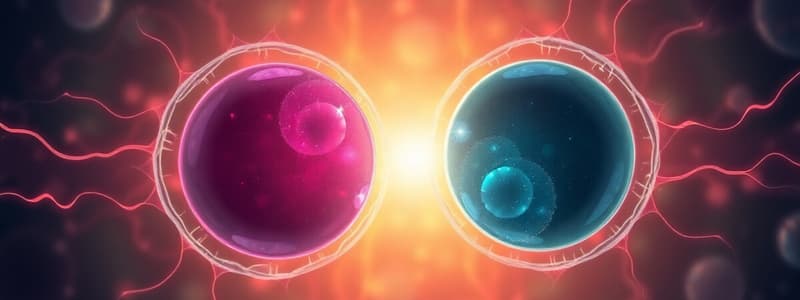Podcast
Questions and Answers
What is the basic number of chromosomes called in a cell?
What is the basic number of chromosomes called in a cell?
- Haploid number
- Diploid number
- Chromosome set (correct)
- Chromosome pair
What type of cell division occurs specifically in reproductive organs to produce gametes?
What type of cell division occurs specifically in reproductive organs to produce gametes?
- Meiosis (correct)
- Binary fission
- Cytokinesis
- Mitosis
How many chromosomes does a human gamete contain?
How many chromosomes does a human gamete contain?
- 1
- 48
- 23 (correct)
- 46
What is the result of the fusion of male and female gametes during fertilization?
What is the result of the fusion of male and female gametes during fertilization?
Homologous chromosomes are defined as pairs of chromosomes that come from which sources?
Homologous chromosomes are defined as pairs of chromosomes that come from which sources?
What occurs during anaphase I of meiosis?
What occurs during anaphase I of meiosis?
What is the result of telophase I in meiosis?
What is the result of telophase I in meiosis?
Which of the following accurately describes meiosis II?
Which of the following accurately describes meiosis II?
What is a key difference between spermatogenesis and oogenesis?
What is a key difference between spermatogenesis and oogenesis?
How many possible orientations can 23 pairs of chromosomes create during meiosis?
How many possible orientations can 23 pairs of chromosomes create during meiosis?
What is the primary purpose of meiosis?
What is the primary purpose of meiosis?
Which phase of meiosis involves the pairing of homologous chromosomes?
Which phase of meiosis involves the pairing of homologous chromosomes?
How many times does a diploid cell divide during meiosis?
How many times does a diploid cell divide during meiosis?
What occurs during the process known as crossing-over?
What occurs during the process known as crossing-over?
What is meant by random assortment during meiosis?
What is meant by random assortment during meiosis?
At what stage do cells undergo interphase before meiosis begins?
At what stage do cells undergo interphase before meiosis begins?
Which statement is true regarding the cells that undergo meiosis?
Which statement is true regarding the cells that undergo meiosis?
What is the role of meiosis in relation to genetic information?
What is the role of meiosis in relation to genetic information?
Flashcards
Meiosis definition
Meiosis definition
A type of cell division that creates gametes (sperm and egg cells) in reproductive organs.
Haploid cell
Haploid cell
A cell with one set of chromosomes (abbreviated as 1n).
Diploid cell
Diploid cell
A cell with two sets of chromosomes (abbreviated as 2n).
Homologous chromosomes
Homologous chromosomes
Signup and view all the flashcards
Gamete chromosome number
Gamete chromosome number
Signup and view all the flashcards
Anaphase I
Anaphase I
Signup and view all the flashcards
Telophase I
Telophase I
Signup and view all the flashcards
Meiosis II
Meiosis II
Signup and view all the flashcards
Spermatogenesis
Spermatogenesis
Signup and view all the flashcards
Oogenesis
Oogenesis
Signup and view all the flashcards
Diploid to Haploid
Diploid to Haploid
Signup and view all the flashcards
Germ Cell
Germ Cell
Signup and view all the flashcards
Crossing-over
Crossing-over
Signup and view all the flashcards
Random Assortment
Random Assortment
Signup and view all the flashcards
Study Notes
Meiosis
- Meiosis is a type of cell division that creates new gametes (sex cells).
- It occurs in reproductive organs (like testes and ovaries).
- Meiosis produces gametes with a haploid number of chromosomes.
- In humans, the haploid number is 23 (1n).
- A diploid cell (2n) has two sets of chromosomes (46 in humans).
- Meiosis involves two divisions, Meiosis I and Meiosis II.
- This process reduces the chromosome number from diploid to haploid.
Number of Chromosomes
- Each species has a characteristic number of chromosomes in its cells.
- Humans have 46 chromosomes (23 pairs), chimpanzees 48, elephants 56, and dogs 78.
Fertilization
- Fertilization is the fusion of male and female gametes.
- The fusion of the nuclei forms a zygote with a diploid number of chromosomes.
- In humans, the zygote has 46 chromosomes (2n).
Homologous Chromosomes
- Paired chromosomes are called homologous chromosomes.
- One chromosome in each pair comes from each parent.
Meiosis I
- Prophase I: Homologous chromosomes pair up, and crossing over occurs (exchange of genetic material between non-sister chromatids).
- Metaphase I: Homologous chromosomes line up in the middle of the cell.
- Anaphase I: Homologous chromosomes separate and move to opposite poles of the cell.
- Telophase I: The chromosomes reach the poles, cytokinesis begins, and two haploid cells are formed.
Meiosis II
- Meiosis II is similar to mitosis, but it begins with haploid cells.
- Prophase II: Chromosomes condense.
- Metaphase II: Chromosomes line up in the middle of each cell.
- Anaphase II: Sister chromatids separate and move to opposite poles.
- Telophase II: Chromosomes reach the poles, cytokinesis begins, and four haploid cells are produced.
Mitosis vs. Meiosis
- Mitosis produces two diploid cells from one diploid cell, maintaining the chromosome number.
- Meiosis produces four haploid cells from one diploid cell, reducing the chromosome number by half.
- Meiosis produces genetic variation through crossing-over and independent assortment.
Gamete Differences
- Spermatogenesis (sperm production) starts at puberty, producing four gametes.
- Oogenesis (egg production) begins before birth, but pauses until puberty and produces only one mature ovum (egg) during each cycle, with unequal division of cytoplasm.
Studying That Suits You
Use AI to generate personalized quizzes and flashcards to suit your learning preferences.




